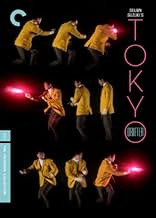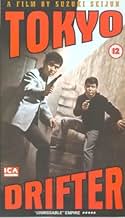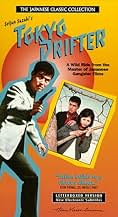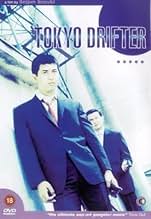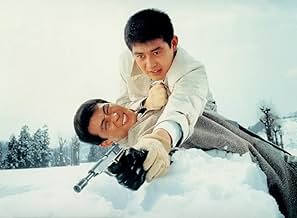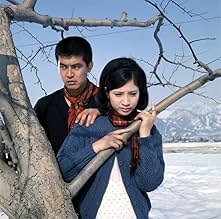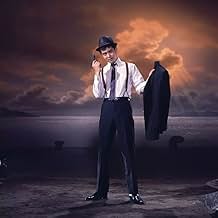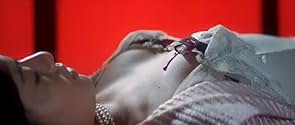IMDb RATING
7.1/10
10K
YOUR RATING
After his gang disbands, a yakuza enforcer looks forward to life outside of organized crime but soon must become a drifter after his old rivals attempt to assassinate him.After his gang disbands, a yakuza enforcer looks forward to life outside of organized crime but soon must become a drifter after his old rivals attempt to assassinate him.After his gang disbands, a yakuza enforcer looks forward to life outside of organized crime but soon must become a drifter after his old rivals attempt to assassinate him.
Featured reviews
'Tokyo Drifter' is one of the coolest movies I have ever seen in my life! It is so cool that you almost think you dreamed it up, but no, someone (the criminally underrated Seijun Suzuki) actually MADE this movie. Storywise it is your standard Yakuza crime thriller, but the approach is totally off the planet, with stylized sets, vibrant cartoonish colours and a naggingly insistent theme song. This movie has gotta be seen to be believed! You MUST see this movie!
Sensible logic might be little, but director Suzuki Seijun's surrealistic pop-art gangster feature "Tokyo Drifter" is a tour-de-fore in flamboyant, and unusual film-making. Everything about this fashionably unhinged effort reeks of ultra-coolness, with its edgy but trendy stylish guidance painting an influential pathway for many film-makers to experiment, but also providing familiar staples of noir and western inspirations to its own brash, creative juices. I admit the busily dry story is quite an unbalanced muddle, with fractured editing, but still for that time glamorously unconventional and erratically bewildering. The focus of the material is that of devotion (of business and love), but some quirky sight gags and mayhem make there way in. Mainly it's all about the majestic set-pieces though, and the delirious appeal of them are a wondrously enchanting sight. A trippy colour scheme infuses itself on the psychedelically warped set-designs of moody composition lighting, and the sudden bursts of exaggerated violence have a poetically tough awe surrounding it. The taut pace of the film stays pretty much on cruise control, but where the energy feeds off can be linked to Kaburagi So's fierily dramatic jazz musical score, and Mine Shigeyoshi's intimately snappy cinematography positioning. Even breaking up the murky narrative are odd song choices and a rhythmic theme. The colourful performances are dashing, and life-like with a brooding array of interesting characters. Testsuya Watari, HidekaI Nitani, Ryuji Kita, Chieko Matsubara and Eiji Go are enjoyably tailored to their parts. Highly stylised fun.
If you are fed up by ordinary manufactured campiness, but still have normal levels of humor.. Which is to say if you find Austin Powers not only boring but trivial, you might check this out. It is high camp. It is ridiculous in ways that in other action films we readily accept: think the recent James Bonds. There is a joke product placement — for hair driers — that is really funny.
We have the ordinary sort of thing that qualifies: cheesy songs, goofy hero, posed action, jingly hipness. But we have a level of cheesiness that goes beyond the Tarrantino level, beyond the usual joke. The cinematography is one big joke, one that still works today because the big movies still use Vietnam era visual devices.
We have jokes on Bertralucci, Welles, Kurosawa. Leone of course. We have a couple stagings from Bergman even. It is not worth the effort to single out any Frenchman it seems, treating them with the contempt of wholesale dismissal.
Under ordinary circumstances, I would not recommend this because the usual level of the joke gets pretty tiring after 20-30 minutes. But the cinematic jokes and references keep coming, as though there were a catalogue (like we are told the Coen brothers keep). The blatant vacancy of the visuals is pretty damning.
Ted's Evaluation -- 2 of 3: Has some interesting elements.
We have the ordinary sort of thing that qualifies: cheesy songs, goofy hero, posed action, jingly hipness. But we have a level of cheesiness that goes beyond the Tarrantino level, beyond the usual joke. The cinematography is one big joke, one that still works today because the big movies still use Vietnam era visual devices.
We have jokes on Bertralucci, Welles, Kurosawa. Leone of course. We have a couple stagings from Bergman even. It is not worth the effort to single out any Frenchman it seems, treating them with the contempt of wholesale dismissal.
Under ordinary circumstances, I would not recommend this because the usual level of the joke gets pretty tiring after 20-30 minutes. But the cinematic jokes and references keep coming, as though there were a catalogue (like we are told the Coen brothers keep). The blatant vacancy of the visuals is pretty damning.
Ted's Evaluation -- 2 of 3: Has some interesting elements.
"Tokyo Drifter" is my introduction to the cinematic work of director Seijun Suzuki and it made quite a big impression. This is by far one of the most visually unique movies I have ever seen and the fact that it was made in 1966 makes it even more impressive.
Tetsuya played by Tetsuya Watari is a yakuza who has joined his boss Kurato (Ryuji Kita) in going straight. Unfortunately for both of them a rival gang begins threatening Kurato's legitimate business. After a brief confrontation Tetsuya is forced to leave his boss that way he would hopefully relieve the pressure between Kurato and the gang. Things don't go as smoothly as Tetsuya planned and he finds himself chased by gangs all over Japan.
The story is standard fare yakuza tale. With a hefty doze of betrayal, inner power struggles and a bit of melodrama in the form of Tetsuya's girlfriend. We've seen it all before. Now. What really sets this movie apart from any other is it's unique visual nearly surrealistic style. Suziki employs several tricks in order to assure that the film will remain distant from any other. His use of colors creates one part of the that. More accurately his use of color contrast, we see that in several scenes through the movie, for example during the final shootout we see gang members dressed in primarily black suits while the location itself was in mainly white bright colors. Tetsuya himself is often dressed in colors that merge him with the backgrounds further helping in the creation of the film's extravagant look. The second aspect of the movie's uniqueness is the camera work and the overall directing. Suziki employs techniques that are reminiscene of western movies and more specifically Sergio Leone's line of work. The final shootout again serves as a great example of that.
The acting is on par with the script, characters are well played by their respective actors. They don't make an overly big impression but certainly don't deteriorate the quality. The film has a good music score with a particularly memorable theme song by the main actor Tetsuya Watari that is always nice to hear and fit's very well with the mood.
"Tokyo Drifter" is a movie that offers stunning visuals and a plot that while not very deep in characterization is still able to carry the film's unique style. Mister Suzuki is able to impress, sadly his production company at the time wasn't on the same opinion and soon after he was fired and blacklisted for 10 years. A real shame for a director with such talent.
Tetsuya played by Tetsuya Watari is a yakuza who has joined his boss Kurato (Ryuji Kita) in going straight. Unfortunately for both of them a rival gang begins threatening Kurato's legitimate business. After a brief confrontation Tetsuya is forced to leave his boss that way he would hopefully relieve the pressure between Kurato and the gang. Things don't go as smoothly as Tetsuya planned and he finds himself chased by gangs all over Japan.
The story is standard fare yakuza tale. With a hefty doze of betrayal, inner power struggles and a bit of melodrama in the form of Tetsuya's girlfriend. We've seen it all before. Now. What really sets this movie apart from any other is it's unique visual nearly surrealistic style. Suziki employs several tricks in order to assure that the film will remain distant from any other. His use of colors creates one part of the that. More accurately his use of color contrast, we see that in several scenes through the movie, for example during the final shootout we see gang members dressed in primarily black suits while the location itself was in mainly white bright colors. Tetsuya himself is often dressed in colors that merge him with the backgrounds further helping in the creation of the film's extravagant look. The second aspect of the movie's uniqueness is the camera work and the overall directing. Suziki employs techniques that are reminiscene of western movies and more specifically Sergio Leone's line of work. The final shootout again serves as a great example of that.
The acting is on par with the script, characters are well played by their respective actors. They don't make an overly big impression but certainly don't deteriorate the quality. The film has a good music score with a particularly memorable theme song by the main actor Tetsuya Watari that is always nice to hear and fit's very well with the mood.
"Tokyo Drifter" is a movie that offers stunning visuals and a plot that while not very deep in characterization is still able to carry the film's unique style. Mister Suzuki is able to impress, sadly his production company at the time wasn't on the same opinion and soon after he was fired and blacklisted for 10 years. A real shame for a director with such talent.
I will argue until my death that TOKYO DRIFTER is superior to BRANDED TO KILL, but that's for another time...
I am amazed every time I see this film that Suzuki could take such an obviously inferior product -- as Nikkatsu Studios was churning out at an obscene rate in those days, giving directors a script and saying "Shoot it fast and cheap so we can give you your next job" -- and turn it into one of the most beautiful and intriguing films I've ever seen.
Best plot ever? No. Easy to follow? Yes. Beautiful? Yes. And that theme...I could never forget that theme if I tried, even after my first viewing.
I'd ramble on about history and plot and so on, but so many others have, I'll just leave it at this: TOKYO DRIFTER makes me happy every time I see it.
I am amazed every time I see this film that Suzuki could take such an obviously inferior product -- as Nikkatsu Studios was churning out at an obscene rate in those days, giving directors a script and saying "Shoot it fast and cheap so we can give you your next job" -- and turn it into one of the most beautiful and intriguing films I've ever seen.
Best plot ever? No. Easy to follow? Yes. Beautiful? Yes. And that theme...I could never forget that theme if I tried, even after my first viewing.
I'd ramble on about history and plot and so on, but so many others have, I'll just leave it at this: TOKYO DRIFTER makes me happy every time I see it.
Did you know
- TriviaWas shot and edited in 28 days.
- Quotes
Tetsuya 'Phoenix Tetsu' Hondo: A drifter needs no woman.
- ConnectionsFeatured in Seijun Suzuki | TCM (2013)
- How long is Tokyo Drifter?Powered by Alexa
Details
Box office
- Gross worldwide
- $755
- Runtime1 hour 29 minutes
- Color
- Sound mix
- Aspect ratio
- 2.35 : 1
Contribute to this page
Suggest an edit or add missing content


